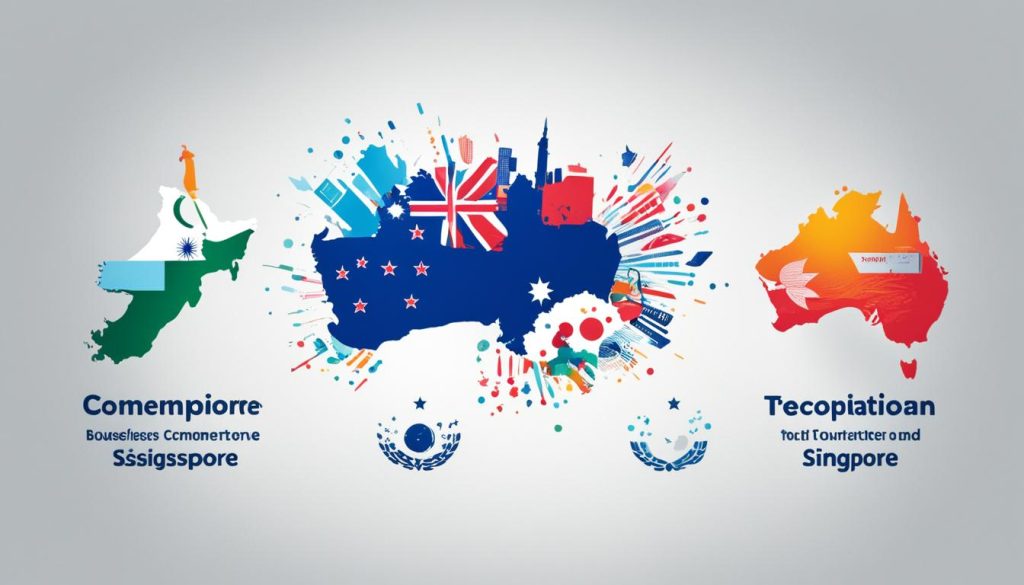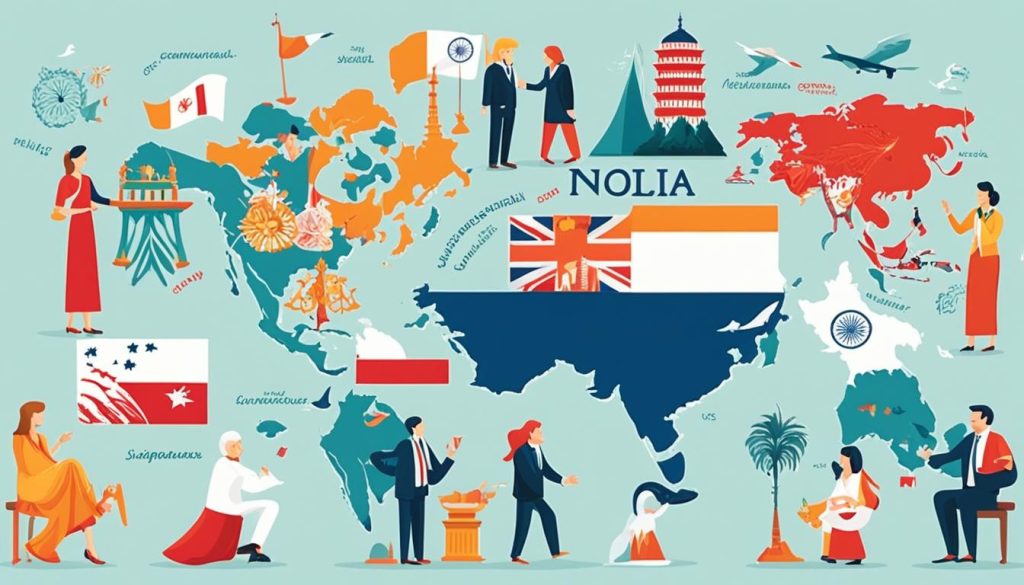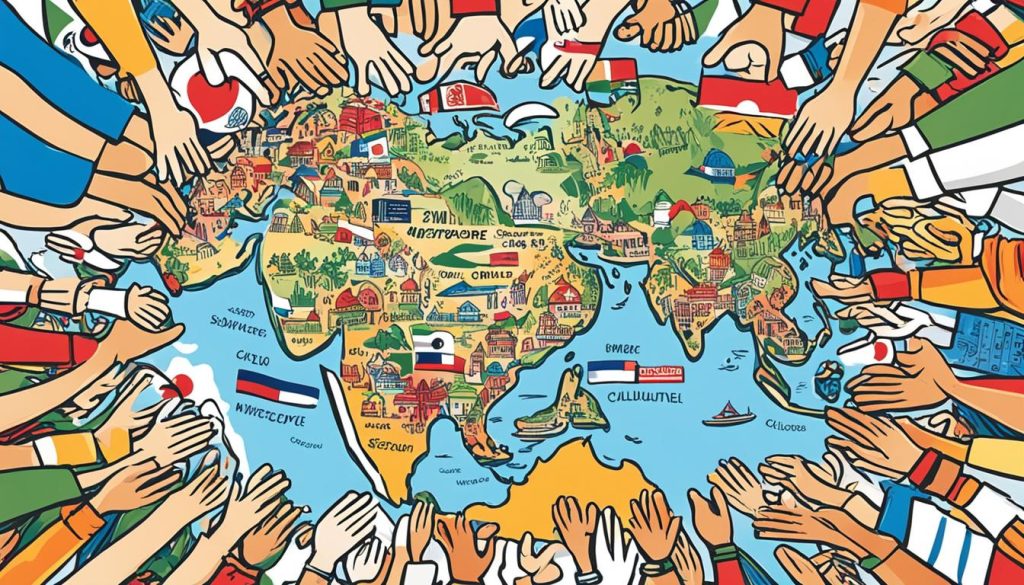The global business world is a mix of different cultures and traditions. Understanding business practices in India, New Zealand’s corporate culture, and Singapore’s business scene is key for businesses looking to grow. This comparison helps us see how culture and business work together. It offers insights into how business is done differently in these places.
Today’s global market is growing fast. Businesses must adapt to many different cultures. India shows us a vibrant mix of traditions affecting business, focusing on relationships and hierarchy. In contrast, New Zealand’s work culture values equality and clear communication, which leads to shared growth. Singapore shows discipline in business, with a focus on practical and innovative approaches.
This cultural comparison looks closely at business practices in India, New Zealand, and Singapore. It helps understand how to approach international business smartly. With cultural knowledge, businesses can navigate global markets more effectively.
Introduction to Differences in International Business Approaches
The world of international business keeps changing. It is influenced by many factors from all over the globe. In today’s world, where global trade makes country borders less important, global business strategies are vital for the success of international enterprises. Focusing on how to enter markets, maintain a presence, or form partnerships, understanding cultural differences is key to either flourishing or just getting by.
Understanding the Global Business Arena
Companies looking to expand outside their home countries face a mix of cultural challenges. Successful business leaders don’t just use their local ways in new places. Instead, they learn cultural intelligence. This helps them adjust their approach to fit different global markets. They get good at spotting cultural norms and weaving them into how they do business.
Cultural Nuances and Business Strategy
Business strategies must quickly adapt to the cultures of the places they operate in. For example, Wal-Mart’s struggles in Mexico offer important lessons. Concepts like power dynamics and how people handle uncertainty, as researched by Hofstede, greatly affect businesses. From marketing to company structure, adapting strategies to local cultures is essential for international success.
The Cultural Framework: Hofstede’s Dimensions Explored
In the world of international business, knowing the cultural drivers of different nations is crucial. Geert Hofstede’s research offers key insights, outlining Hofstede’s cultural dimensions. His work, covering many countries and industries, reveals how national cultural differences influence global business behaviour.
Hofstede identified nine dimensions that highlight the diversity in international settings. These concepts are woven into the social threads of nations. They help business leaders adapt their methods to each cultural setting. This ensures their strategies are in tune with local norms.
- Power Distance: The extent to which less powerful individuals accept and expect the unequal distribution of power.
- Uncertainty Avoidance: How members of a society cope with uncertainty and ambiguity, whereby higher levels indicate a preference for clear rules and structure.
- Performance Orientation: Showing the degree of encouragement society gives towards achievement, heroism, and material success.
- Assertiveness: Related to the level of confrontational and aggressive behaviour in social relationships that individuals consider acceptable.
- Future Orientation: The level of importance a society places on future-oriented behaviours such as planning and investing in the future.
- Humane Orientation: Reflecting on the degree to which individuals are expected to be fair, altruistic, caring, and kind to others.
- Institutional Collectivism: The degree to which societal cultural practices encourage and reward collective distribution of resources and collective action.
- In-Group Collectivism: The level at which individuals express loyalty and cohesiveness in their families or organisations.
- Gender Egalitarianism: The extent to which a society minimises gender role differences and gender discrimination.
Hofstede’s cultural dimensions are a vital toolkit for understanding national cultural differences. They guide businesses in crafting practices that resonate with local traditions. This leads to better management and a deeper understanding of multiculturalism.
Comparative Analysis of Power Distance
Power distance is crucial in understanding organisational dynamics worldwide. It shows how cultures with strict hierarchies contrast with those valuing egalitarian principles. By looking at India, New Zealand, and Singapore, we see how different views on power shape business practices and structures.
India’s Hierarchical Structure
In India, businesses have a strong hierarchical setup. This leads to a high power distance. Subordinates deeply respect their leaders, showing deference. Decisions are made at the top, and age or position often dictates respect.
New Zealand’s Egalitarian Approach
Unlike India, New Zealand embraces an egalitarian way in the corporate world. Their businesses work on a low power distance model. This encourages everyone’s participation and promotes open talks between bosses and their teams. It supports innovation and makes employees feel valued.
Singapore’s Respect for Authority
Singapore finds a middle ground, valuing authority yet fostering team spirit. Businesses respect hierarchy but don’t let it hinder teamwork. This blend of respect for leadership and collective effort forms a unique corporate culture.
Uncertainty Avoidance in Business Decisions
Exploring international corporate strategies shows us the big role cultural approach to uncertaintyrisk assessment in business differently. This affects how they succeed in global markets.
Different cultures impact how corporations manage uncertainty. Some prefer strict rules while others like flexibility. Here’s what this means:
- In places with high uncertainty avoidance, businesses are very careful. Risk assessment in business is detailed, aiming to cover all bases.
- Such environments demand precise planning and reliability. Decisions and governance are highly structured.
- On the flip side, cultures that are okay with uncertainty favour agility. They see unexpected changes as chances to innovate and grow.
This situation shows the importance of being culturally smart in global business. A cultural approach to uncertainty affects more than just rules. It shapes leadership, how we talk to stakeholders, and drives entrepreneurship. Clearly, global companies need to blend local cultures with their strategies to succeed.
Looking at various cases, firms excelling in this area have solid risk assessment in business plans. These organisations don’t just adjust to cultural approaches to uncertainty. They often set new standards for their industry.
Performance Orientation and Competitive Drive

Singapore, India, and New Zealand each have their own way of doing business. They show different attitudes towards competition and how people succeed at work. This diversity reflects their unique cultural beliefs.
Meritocracy in Singaporean Culture
In Singapore, hard work and talent lead to success. The country’s focus on meritocracy means your skills and efforts get you ahead. Everyone, from individuals to companies, pushes to be the best. This is because they believe hard work pays off.
Collective Success in Indian Businesses
In India, working together is valued more than competing as individuals. The culture prefers celebrating group wins over personal glory. This view shapes how success is seen. It makes the work environment more welcoming for everyone.
Individual Achievements in New Zealand’s Work Ethic
New Zealand strikes a balance. While it honours personal success, it also avoids cut-throat competition. The Kiwi culture favours fairness and teamwork in assessing merit. This way, they achieve success without losing their spirit of collaboration.
These three countries show that culture influences how businesses view competition and success. It underlines the role of cultural context in shaping how work is done and how achievements are recognised.
Assertiveness and Communication Styles Compared
In global business, how we talk matters a lot. Being assertive in leadership roles shapes how companies communicate. We look at how assertiveness changes communication in various cultures here.
Talking well in business isn’t just about sending a message. It’s also about how we use words, body language, and negotiation skills. In places like the USA, Germany, and Mexico, being direct is key. Leaders there are clear and to the point, aiming for strong leadership and goals.
On the other hand, New Zealand prefers less assertiveness. They avoid conflict and value everyone’s views. Their way of doing business focuses on being diplomatic and working together. This balance is important for international companies planning their communication strategies.
- High Assertive Cultures:
- Encourages direct and explicit communication.
- Values transparency and straightforwardness in negotiations.
- Assertiveness in managerial roles leads to quick decision-making.
- Low Assertive Cultures:
- Adopts a more indirect and nuanced approach to communication.
- Focuses on harmonious interactions and collective agreement.
- Assertiveness in managerial roles is moderated for inclusivity.
International companies face the challenge of blending assertiveness with local customs. This balancing act poses difficulties. Yet, when done well, it strengthens global relationships and leads to success.
Examining the Differences in Future Orientation
Seeing what tomorrow brings is key for lasting growth in a company. Different cultures prep for the future in their own ways. This influences their economic and business views. Let’s explore how India, New Zealand, and Singapore plan for what’s ahead.
India’s Focus on Long-Term Goals
India values long-term planning in its business culture. Patience and persistence are more important than quick wins. Businesses aim for growth that lasts, investing in people and tech for the long haul.
They train workers for upcoming challenges. Investing in community projects is also key, even if payback is years away.
New Zealand’s Balance of Present and Future
New Zealand finds a sweet spot between now and the future. They prep for what’s coming without ignoring today’s needs. Companies use agile methods to adapt quickly while still planning for what’s next.
Singapore’s Investment in Future Success
Singapore is a leader in thinking ahead and strategic moves. Planning for the future is part of its business core. Innovation, sustainability, and skill-building are where investments go.
This approach keeps businesses sharp, aiming for success tomorrow. They often lead globally in entrepreneurial foresight.
Understanding the Humane Orientation in Business Practices
In today’s global market, humane business and social responsibility are key for forward-thinking companies. By looking at different countries, we see how these ideas blend into their businesses.
Community Welfare in Indian Enterprises
In India, businesses play a big role in community welfare. They value this as much as making money. This mix of economic growth and better life quality shows India’s unique approach. Here, doing good is part of the culture.
Social Responsibility in New Zealand Corporations
New Zealand companies focus on being socially responsible. They weigh profits against green practices and helping the community. This approach is fundamental in New Zealand, blending ethical practices with business success.
Economic Prosperity vs. Social Welfare in Singapore
Singapore aims for wealth but also cares about social responsibility. This approach helps the city-state manage capitalist goals and social good. It’s a tightrope walk, balancing business growth with caring for people.
Institutional Collectivism and Its Impact on Corporate Culture
Institutional collectivism shapes how a corporate culture values teamwork. It shows how much a company supports sharing and working together. Places like Singapore really embrace this idea. There, companies focus on working as a team and achieving goals together.
When a company is all about teamwork, everyone works together to boost creativity and efficiency. Sharing resources means everyone’s work is valued. It also builds a feeling of being responsible together. Such a climate is created by rules that encourage everyone to work towards the same goals. This makes the team more united and dedicated.
- Teamwork is often the cornerstone of a corporate culture that thrives on institutional collectivism.
- Collective resource distribution ensures equitable access to necessary resources and opportunities for all team members.
- The success of the group is celebrated as a unified achievement rather than a series of individual triumphs.
In contrast, some companies focus more on individual success and being accountable on your own. This can make the workplace very competitive. People are rewarded for what they achieve by themselves. This way of working can really change how people interact and feel at work.
This analysis highlights how big an effect institutional collectivism has on how a company operates. It shapes everything from leadership to how decisions are made. For big international companies, it’s key to understand this. They need to fit well with the local way of doing business.
Compare Business and Culture between India, New Zealand and Singapore
In global commerce, knowing the cultural aspects that influence business is key. This is especially true when looking at countries like India, New Zealand, and Singapore. Exploring their cultures shows us how loyalty and diversity affect businesses and leadership.
Analysing In-Group Collectivism in Indian, New Zealand, and Singaporean Societies
India’s culture is big on in-group loyalty. This means businesses often depend on family ties and social networks. This focus on in-group collectivism shapes how companies hire and work together. In contrast, New Zealand values individual achievement and responsibility, leading to a more individualistic approach in businesses. This difference makes organisations adapt their hiring and team management to suit each culture’s unique values.
Singapore finds a middle ground, valuing both the group and the individual. This balance helps companies succeed by combining harmony with recognizing personal achievements.
Gender Egalitarianism and Diversity in the Workplace
Workplace diversity is not just about culture, but also gender equality. New Zealand shines as a progressive example, with balanced gender representation at all levels. However, India and Singapore are still working towards this kind of equality. They face challenges related to traditional roles as they move toward a more inclusive workplace.
This push for diversity means companies must foster policies that support everyone. Creating a workplace that values everyone’s strengths is essential for success.
Cultural Considerations in Leadership Styles
Leadership diversity shows how culture affects how businesses are run. In India, leaders are often seen as father figures. Their decisions reflect the social hierarchy and respect within the culture. In New Zealand, the approach is more consultative, promoting teamwork and shared responsibilities. This leads to a less hierarchical structure.
Singapore blends Eastern and Western styles, creating a unique leadership style. This approach respects hierarchy while encouraging innovation and open communication. It’s a reflection of Singapore’s diverse business culture.
Understanding Global and Local Challenges in Business Environment
Multinational companies face tough tasks. They need to adapt to different markets and respect cultural differences. Balancing global business with local traditions is tricky. But it’s crucial for success in international markets.
Adapting to Local Markets: India, New Zealand and Singapore
India, New Zealand, and Singapore each have unique business scenes. Companies must understand these differences. In India, strategies must connect with local cultures. New Zealand values honesty and ethics. Singapore requires efficiency and knowing the rules.
Legal and Ethical Compliance in Different Cultural Settings
Following laws is just one part of cross-cultural compliance. Companies must also consider ethics and cultural sensitivity. They need to follow local laws in places like India, New Zealand, and Singapore. At the same time, they must keep to a global ethical standard. This approach protects the company’s reputation and builds trust worldwide.
Impact of Cultural Dimensions on Management Functions
In international business, grasping how culture influences planning is crucial. It’s not just scholarly talk; it’s needed for success. Geert Hofstede’s insights into cultural dimensions help shape management approaches to fit local ideals.
The variety of the global market means the cultural impact on planning changes strategy creation. In cultures that dislike uncertainty, for example, detailed plans are preferred. This focus on avoiding risk affects how managers plan and allocate resources.
- Planning: Cultures valuing long-term goals might emphasize future planning. On the flip side, those with a short-term focus might prioritise quick wins and flexibility.
- Organising: The setup of teams and how much say employees have can mirror the local power distance. Low power distance might lead to more teamwork and shared decision-making.
- Leading: Leadership styles can differ, too. Some cultures prefer a competitive edge. Others might go for a more cooperative approach.
- Controlling: How performance is checked and feedback given can vary. Some methods are straightforward and direct, while others might be group-based and gentler.
Knowing the cultural impact on planning shapes our understanding of leadership as well. In places with high power distance, bossier leadership might be normal. But in more equal societies, leading together is more common.
To wrap it up, applying cultural knowledge in management approaches is key for global leadership. By paying attention to these cultural aspects, managers can set up for success abroad.
Case Studies: Successful and Unsuccessful Cultural Integrations
The study of business expansion case studies gives vital clues about global business and local customs. These stories show the important strategies of cross-cultural management techniques. They help us understand what works and what fails.
Lessons Learned from International Business Expansions
Many stories tell of expansion attempts, like PepsiCo’s in Southeast Asia. A misunderstanding of local culture caused a setback. This highlights the need for cultural understanding in business plans. Such stories warn and guide new businesses aiming for success across borders.
Best Practices for Cross-Cultural Management
Success in global business is more than just changing business models. It involves agile leadership that respects local cultures. This shows that understanding and integrating local customs into business is crucial.
- Engage in thorough cultural research and respect local practices.
- Adopt a flexible approach to blend organisational objectives with cultural expectations.
- Cultivate open communication and promote mutual understanding within multinational teams.
A skilled cross-cultural manager acts both as a strategist and a diplomat. They gracefully handle the challenges of different cultures.
- Strive for local partnerships to gain authentic cultural insights.
- Promote diversity at the managerial level to reflect a wide range of perspectives.
Adopting these strategies reflects the true spirit of global business. It shows how embracing cultural differences strengthens a company’s global presence. This approach proves key to lasting success abroad.
Conclusion
When we examine the world of global management, we learn a lot from looking at India, New Zealand, and Singapore. These insights are crucial for any business wanting to succeed in today’s connected economy. To do well in cross-cultural business, we must fully understand and respect different cultures. This understanding is the foundation for building and strengthening global management views.
Globalisation has created a time where blending corporate cultures is essential. Businesses must adapt their models to fit different cultural settings to survive and grow. By merging strategic insights with an awareness of cultural differences, businesses can innovate and respond better. It’s clear that adapting to different cultures is not just theory; it’s a must for success in the global market.
In wrapping up, businesses that embrace and use various cultural traits do well globally. Successfully mixing cultural understanding with adaptable management strategies is key to international success. Exploring business cultures in India, New Zealand, and Singapore shows us that global management combines art and science. It relies on deep respect for and knowledge of different cultures.














